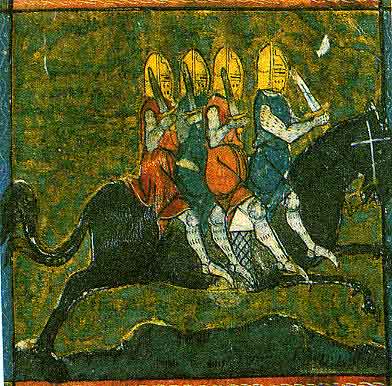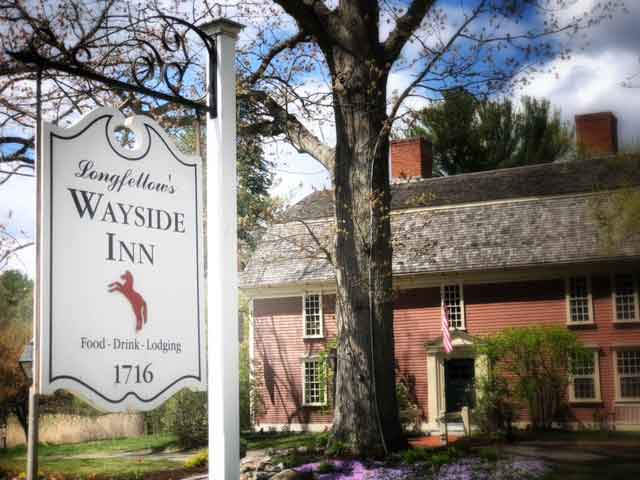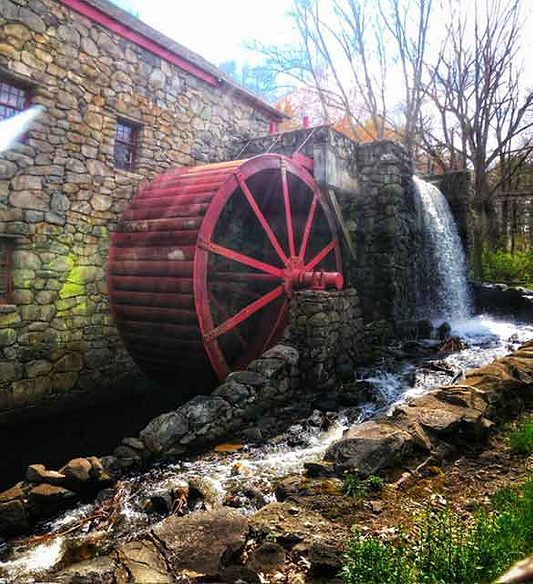“And there went out another horse that was red: and power was given to him that sat thereon to take peace from the earth, and that they should kill one another: and there was given unto him a great sword.”
Revelation 6:4 from the King James version of the Bible
 They were the sons of Death and hell followed with them as they rushed from Sudbury to Concord, Massachusetts, in the lightening dawn of April 19, 1775. Beside them, armed with muskets, swords, pitchforks, and improvised weapons, came two companies of Sudbury minutemen and militia, and behind them (as legend says),
on a white horse, a messenger galloped
west towards Worcester carrying the alarm
“Up! Up! The Regulars are as far as Concord!”
They were the sons of Death and hell followed with them as they rushed from Sudbury to Concord, Massachusetts, in the lightening dawn of April 19, 1775. Beside them, armed with muskets, swords, pitchforks, and improvised weapons, came two companies of Sudbury minutemen and militia, and behind them (as legend says),
on a white horse, a messenger galloped
west towards Worcester carrying the alarm
“Up! Up! The Regulars are as far as Concord!”
They were Ezekiel Howe, a lieutenant colonel in the 4th Middlesex Militia Regiment of Massachusetts, and David Howe, a private in Sudbury’s South Militia Company. They were the sons of Hepzibah Death and David Howe, innkeeper of the Howe Tavern (today known as The Wayside Inn) on the Post Road that stretched from Boston to Worcester and points west.
Their mother, Hepzibah Death (also recorded as D’Eath and D’Ath) was descended from ancestors in the Ath region of Belgium where there lingers the eighth century legend of Bayard, the supernatural red horse who carried the four sons of Aymon in their quest to defeat King Charlemagne. Knowing the horse was the sons’ source of power, King Charlemagne captured Bayard, forced the horse into a river with millstones tied around his neck, and left him to drown. But Bayard kicked the millstones with his hooves, shattering them into pieces. Rearing from the water, the red horse galloped into the woods, where his spirit is said to run free forever.

The Horse Bayard Carrying the Four Sons of Aymon, a miniature in a manuscript from the fourteenth century.
| Public domain. wikipedia.orgOver centuries, countless people from Charlemagne’s old kingdom, which included Belgium and France, voyaged to the British Isles. Among them, the family Howe, whose surname meant “people of the hills” or “hill spirits.” By the early 1600s, the spirits of Howes who followed the Puritan faith may have felt uneasy as their beliefs conflicted with those of King James VI of Scotland/I of England, whose reign saw the publication of a new version of the Bible. Called The King James Bible, this version differed from the Geneva Bible that the Puritans followed. Hastily printed, early editions had typos, including “Behold, the Lord our God hath showed us his glory and his great-ass” (instead of his “greatness”), and the instruction that “thou shalt commit adultery.”
None of this went over well with the Puritans, nor did the religious reforms that James’ son, King Charles I, began implementing when he assumed the throne in 1625. Puritans who refused to conform were subject to punishment, such as being fined, or stripped of their pulpits, property, and, in some cases, their ears. Hundreds of Puritans fled England for America, arriving in the Massachusetts Bay Colony. Amongst them was John Howe, who, in 1638, joined other settlers in founding Sudbury, Massachusetts, the third inland town in the Bay Colony after Concord (1635) and Dedham (1636). John Howe became the grandfather of David Howe, the husband of Hepzibah Death.
Around 1707, David and Hepzibah built a small house and mill in Sudbury in an ideal rest point for weary travelers between Boston, Worcester, Connecticut, and New York. In 1716, David Howe obtained an innkeepers license and opened the Howe Tavern. Here, David and Hepzibah had four sons: Eliphalet, Israel, David, and Ezekiel. When grown, Eliphalet and Israel moved to Rutland, MA. David and Ezekiel remained in Sudbury where, like most men of the day, they were members of the local militia. Around 1744, Ezekiel assumed tavern ownership from his father and eventually renamed it The Red Horse Tavern.
Ezekiel was also a member of the Committee of Correspondence, a network of colonists who shared important information across the colonies and gathered for discussions that, by the 1770s, were increasingly leaning towards independence from British rule. In 1774, the first Provincial Congress assembled in Concord, and preparations began for the colonists to supply and form their own Continental Army, provisions for which were being stored in Concord.
Spies tipped off General Thomas Gage, the royally appointed military governor of Massachusetts, and just before midnight on April 18, 1775, twenty-three miles to the east of Sudbury, nearly 800 of the king’s troops set out from Boston to Concord to find and destroy the supplies. Ahead of them, Paul Revere, an express rider for the Boston Committee of Correspondence, began his infamous “Midnight Ride” to Concord, shouting, “Awake! Awake! The regulars are coming out!”
Near 3:30 a.m., another messenger galloped into Sudbury shouting that the regulars were out as far as Concord. Ringing church bells, musket shots, and signaling drumbeats filled the air, summoning the town to awake and muster.
 ©Barrow Bookstore
©Barrow BookstoreOut of the Red Horse Tavern, sword strapped to his side, ran 55-year-old Lt. Col. Ezekiel Howe. By 5 a.m., he, his 57-year-old brother Private David Howe, and two companies of Sudbury militia and minutemen were on the march to Concord. From different routes, more Sudbury militia companies were close behind.
As recorded by Concord minister Ezra Ripley and based on eyewitness interviews, when Lt. Col. Howe’s group reached Concord, they “were stopped about half a mile from the south bridge, by a messenger, Mr. Stephen Barrett, son of the colonel [James Barrett], and informed that the south bridge was taken up and guarded by the British, and that they must march round to the north bridge. In this route they had to pass by Col. Barrett’s, where the British were then actually destroying public property. The company halted near the British, and Lieut. Col. Howe… concealed his sword under his coat, and pretending business, obtained leave of the British officer commanding that part, to pass unmolested. He had gone but a little way, when the firing at the [North] bridge was heard, on which he turned back, offering a reason for not proceeding, and receiving an angry threat from the officer, rejoined the Sudbury company, and pursued the enemy in their retreat from Concord.”
Leaving Concord, near Meriam’s Corner, the Howe brothers, Sudbury companies, and other arriving militia—now over 1,500 strong—clashed with the king’s troops. A running battle continued back to Boston. By day’s end, 100 regulars and 47 colonists (including two from Sudbury) were dead. The American Revolutionary War had begun.
According to the Massachusetts State Archives, on May 10, 1776, Ezekiel Howe was a commissioned colonel of the 4th Middlesex Regiment and amongst “militia regiments that marched from Massachusetts to the state of New York under command of Maj. Gen. Lincoln” returning in November 1776. Citing ill health, Ezekiel submitted his resignation in 1779 and returned to being an innkeeper at the Red Horse Tavern. The American Revolutionary War ended on September 3, 1783.
The tavern remained in the Howe family until 1861, changing hands before becoming today’s Wayside Inn. Today, a rearing red horse graces the Inn’s sign; a reminder, perhaps, of the sons of Hepzibah Death, who came to Concord’s aide and played their role in America’s quest to defeat a king and run free forever.
For a list of sources, email barrowbookstore@gmail.com.


